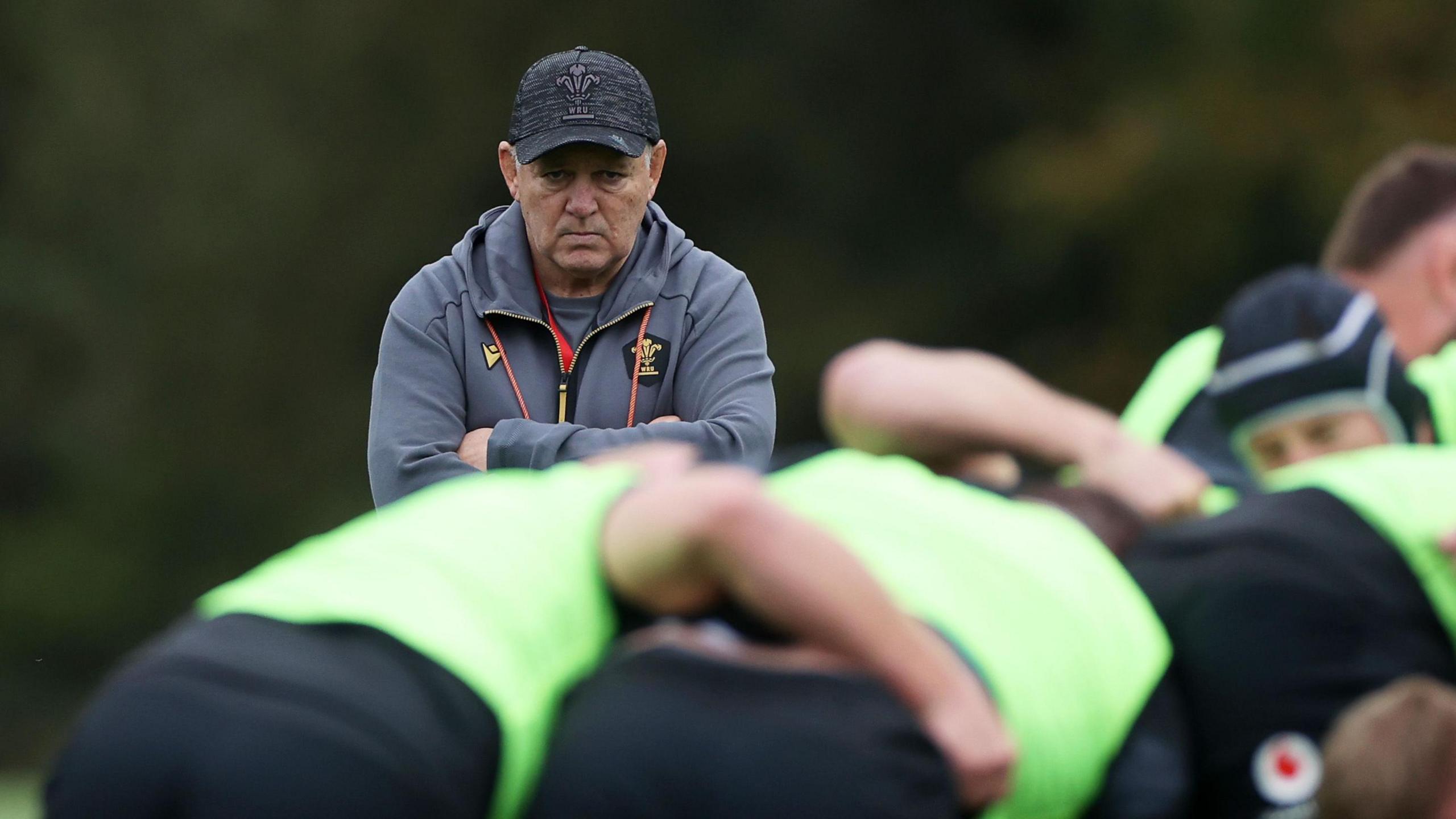Gatland bids to avoid equalling worst losing run

Warren Gatland will oversee his 155th Test for Wales on Sunday
- Published
Welsh rugby has long had an unhealthy obsession with the number 10 but perhaps this weekend it is justified with an unwanted record lurking.
Since the days of Cliff Morgan to Barry John and Jonathan Davies, the number has shone as a symbol of excellence.
Now it could represent a banner of failure as Wales aim to avoid a 10th Test defeat in a row.
Warren Gatland faces Fiji on Sunday desperate not to equal the worst losing run in Welsh rugby history.
It was, by coincidence, under another New Zealander - Steve Hansen - that Wales sank to new depths between 2002 and 2003 before Romania were rolled out as cannon fodder before that autumn's World Cup.
There are clear parallels between now and then and, at times, Gatland's words could have come straight out of Hansen's mouth 21 years on.
The need to fast-track a new crop of players at the sharp end of Test rugby - 13 uncapped players used in 2024 alone - against a period of domestic upheaval.
In 2003, Welsh rugby was in the process of ditching 120 years of history with the formation of regions, which today is fighting to survive.
The national team is a reflection of the regions but for all the need for patience as foundations are laid, a win on Sunday is now surely a non-negotiable or Remembrance Day could be remembered in rugby for all the wrong reasons.
- Published8 November
- Published4 November
- Published8 November
That has been the message seeping out of the Wales camp all week.
Lock Will Rowlands, one of a clutch of experienced players returning for this campaign, described how "school time is over" for Wales.
Forwards coach Jonathan Humphreys laboured the need for "processes" before finally conceding that Wales, right now, would just be happy with a win, no matter how ugly.
The axe is not hovering over Gatland's neck yet and so the coach is still showing the courage of his convictions.
“Results are important but I'm not thinking about my own position or how I protect my own backside. It’s about making the right decisions for Wales," said Gatland.
"We lost a huge amount of experience after the World Cup so we knew we were going to go through some pain. Hopefully we build a team that has sustainability and success for the next few years.
"I understand short-term is also important and international rugby is about winning and performance.
"There’s no hiding from it, the expectations and scrutiny in international rugby comes with the territory. I’m comfortable with that.
"But it's about putting your hand on your heart and saying you honestly believe you're making the best decisions for Wales."
Reasons for optimism
For the first time since last year's World Cup, Gatland admits he is "excited" by the make up of his squad.
As well as raw talent in the shape of Josh Hathaway, Max Llewellyn, Ellis Bevan and Freddie Thomas there is experience to offer a guiding hand.
"We're starting to see some real competition for places now and especially when you consider the players not available," said Gatland.
Players have arrived in camp with some domestic form, not least the quintet from Gloucester that include the half-back pairing of Gareth Anscombe and Tomos Williams. They will offer control while returning locks Will Rowlands and Adam Beard provide stability.
Jac Morgan's return could inspire, albeit from the bench, Blair Murray offers a genuine left-sided option while there is competition for places at centre.
Fiji will doubtless improve from last week's record 57-17 loss to Scotland, not least their discipline, but Wales have won their last six meetings, including an epic at the World Cup last year.
Gareth Anscombe and Tomos Williams start together for Wales for the first time since the 2023 World Cup
What must Wales get right this autumn?
Gatland suddenly has an abundance of midfield options but must look to settle on a midfield pairing for the Six Nations.
This weekend he has picked the fifth different combination of 2024 as he looks to find successors to established World Cup duo Nick Tompkins and George North.
Ben Thomas and Max Llewellyn get the nod against Fiji but Eddie James and Owen Watkin will also get a chance this month.
Wales must find a clinical edge that has been missing for much of the year while returning figures will help sure up a lineout that wobbled in Australia.
The front-row has fitness issues across the board but looks stronger for the return of Nicky Smith and Ryan Elias, and while Archie Griffin has been earmarked as a future Test tight head, he needs far more time on the pitch for club and country.